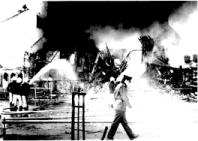
All in a day's work...
For many people the Troubles has become part of their everyday working
life.
Doctors, firemen, ambulance men, priest and ministers have all had
to deal with the impact of violence in their careers.
Drumcree '96.
It was intense,
one of the most traumatic events in my life.
I found myself hardly able to eat
On the Sunday morning
it was a bit like Vietnam or 'Apocalypse Now'.
The day after Michael McGoldrick was shot
we received a fax in our house
which read 
"One down, 5,999 more to go!"
That was a chilling message.
I was uneasy that there might be killing
that guns might be used rather than plastic rounds.
I thought, as a priest
I might have to minister to dying people.
But it was quite unreal
to find yourself in a war situation
in your own neighbourhood.
......
I worked in the Casualty Department of the Royal Victoria Hospital.
Dealing with injuries, in order to do your work efficiently
I had to think in terms of what is the blood pressure?
Where can I get a needle into a vein to get a blood transfusion
going?
Do I need to take x-rays?
During the worst periods I would have been involved with maybe
eight seriously injured people on a bad day;
If somebody was found to be dead on arrival at hospital
or if they got into the resuscitation room and then died there,
it was my responsibility to break the news to the relatives.
So I met Catholic families,
I met Protestant families,
I met paramilitary families
and I met families with no political involvement.
Although I saw a lot of patients with severe injuries
this didn't effect me emotionally the way the deaths did.
Additional extracts from: Baptist pastor to Loyalist paramilitaries
and a firefighter who worked in Belfast at the height of the violence in
the 1970s.
Proceed to next section 'Far From Home'
Return to main exhibition page
| 